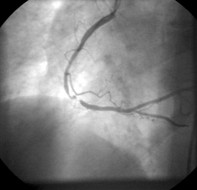Peer Reviewed
Feature Article Cardiovascular medicine
Optimal medical management of coronary artery disease
Abstract
Coronary artery disease is the largest single cause of death in Australia. GPs have a key role in providing long term management and support to patients who have the disease and to those who are at risk of developing it.
Key Points
- The goals of management for coronary artery disease are two-fold: to reduce the risk of death and myocardial infarction, and to reduce symptoms of angina and the occurrence of ischaemia.
- All patients with coronary artery disease should be screened for diabetes, which is often unmasked during a presentation with an acute coronary syndrome. All diabetic patients with proteinuria should be treated with an ACE inhibitor.
- Antiplatelet agents have unequivocal benefits in coronary artery disease. Unless contraindicated, aspirin should be used indefinitely by most patients who have known cardiovascular disease.
- ACE inhibition should be considered in all coronary artery disease patients.
- Patient education is often neglected in the management of patients with coronary artery disease. Explanations about recognising symptoms that can be suggestive of acute myocardial infarction are particularly important.
Purchase the PDF version of this article
Already a subscriber? Login here.

